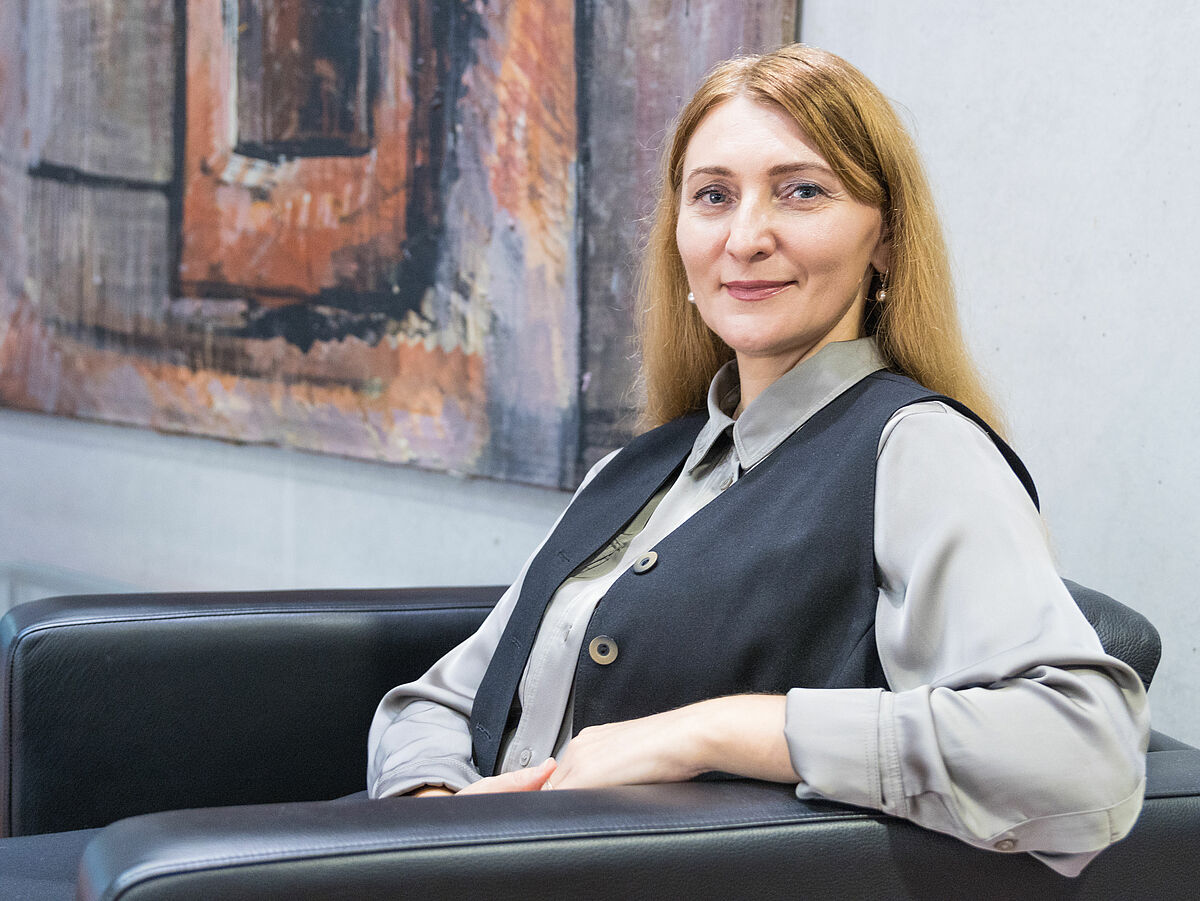
Professorin Dr. Alla Kozhyna
Alfried Krupp Junior Fellow
(Mai 2022 - August 2022)
- Studied Economics at the Odessa State Economic University, Ukraine
- D.Sc. in Public Administration, National Academy for Public Administration under the President of Ukraine; Ph.D. in Public Administration, Academy of Municipal Administration, Kyiv
- Associate Professor, Educational and Scientific Institute of Public Administration and Civil Service, Taras Shevchenko National University of Kyiv (until 6/2022), Head of the Institute of Public Strategies
Fellow-Projekt: „Quality of Society: The Impact of Inclusive Approaches to tackling Poverty, Inequality and Social Exclusion in Eastern Europe“
Poverty, inequality and social exclusion are the most fundamental problems that humanity faces and which have a growing tendency in the world and in the EU, especially in Eastern European countries. This is due in particular to the impact of the Covid-19 pandemic, Russia's aggression against Ukraine, rising energy prices, inflation, food shortages, and the climate crisis. The project focuses on the interdisciplinary investigation of inclusive development policy, inclusive approaches and their possibilities and impact on improving standards of the quality of life and the quality of society. We assume that everyone has the right to participate in civic, political, economic, social and cultural life, and traditional economic development strategies are becoming more expensive. Inclusive approaches do not conflict with business interests and can benefit economic growth and equity. Greater diversity and greater participation in the workforce also leads to innovation and stimulates the new businesses creation. I explore strategies for equal opportunities for education and employment, policies to reduce poverty, inequality and social exclusion in European countries, in particular in the context of achieving the 2030 Sustainable Development Goals (SDGs), and the features of digital inclusion as an important component of inclusive development policy in the context of Europe’s digital future.
Ergebnisse des Fellowships
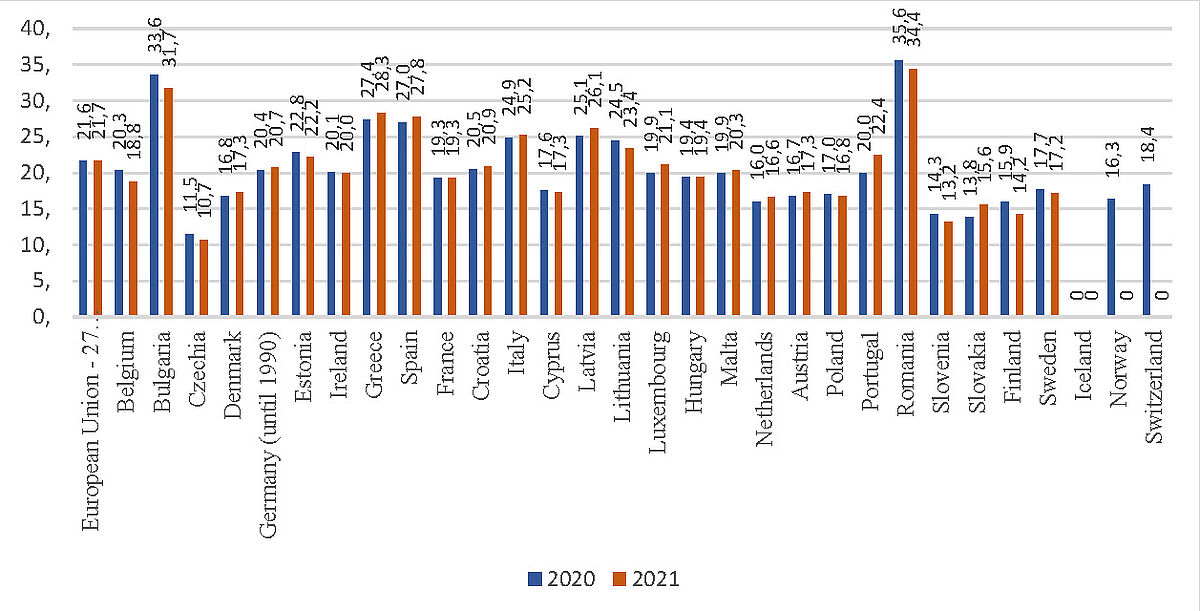
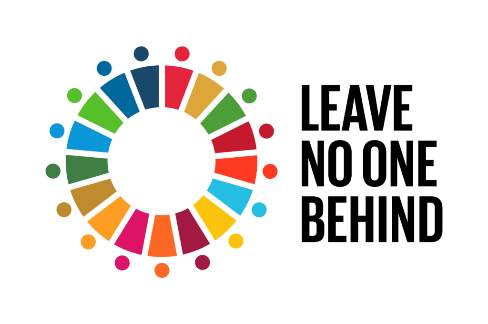
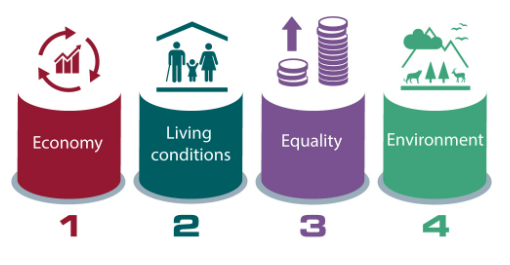
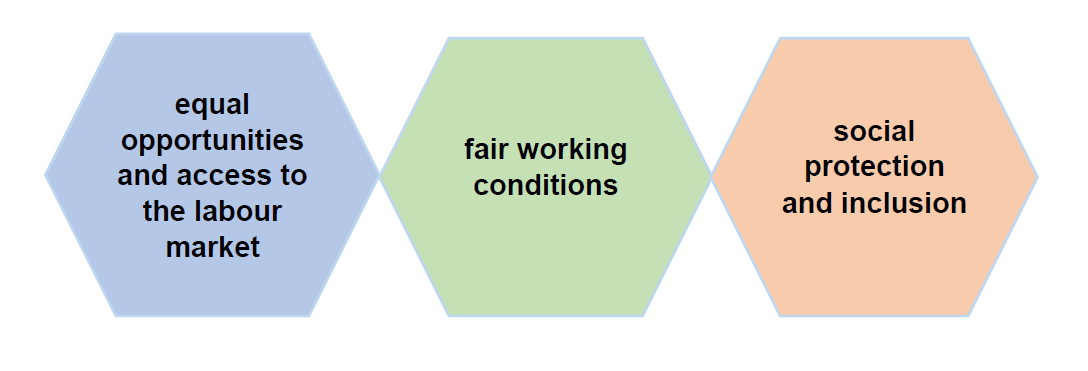
The issue of human well-being and quality of life are always in the focus of attention of researchers from various fields of science and practice. This is due to the fact that social challenges not only do not decrease, but also take on new forms and types. After a period of improvement of a significant share of indicators of the level and quality of life in various parts of the world, recent years have brought it all to nothing.
The Covid-19 pandemic has had a significant impact; it has already led to a setback in human development in almost all countries. The war in Ukraine in 2022 significantly influenced the development of countries, primarily on the European continent. There are migration, unprecedented energy price increases and ongoing supply chain disruptions, climate change, and more. These problems have led to the growth of poverty, inequality, and social exclusion. Therefore, today the issue of people's well-being and quality of life comes to the fore.
EU policy is aimed at mitigating the economic and social consequences of the coronavirus pandemic and increasing energy prices. Its main task is to make European economies and societies more sustainable, resilient and better prepared for the challenges and opportunities of the green and digital transitions. At the same time, the EU countries build their policies and activities based on the following principles: resilience, stability, cohesion, integration, and inclusion.
In the aftermath of the global economic crisis, trust among Europeans in society and its institutions declined, causing concerns about economic and social insecurity, perceived inequalities, societal tensions and lack of fairness.
According to Eurostat data on the living conditions in Europe, in 2021 95.4 million people in the EU, representing 21.7% of the population, were at risk of poverty or social exclusion. Among the 95.4 million people in the EU that faced the risk of poverty or social exclusion, some 5.9 million (1.3% of the total population) lived in households experiencing all three poverty and social exclusion risks simultaneously. In 2021, 73.7 million people in the EU were at risk of poverty, while 27.0 million were severely materially and socially deprived, and 29.3 million lived in a household with low work intensity. The risk of poverty or social exclusion varied across the EU Member States. The highest shares of people at risk of poverty or social exclusion were recorded in Romania (34%), Bulgaria (32%), Greece and Spain (both 28%). In contrast, the lowest shares of people at risk of poverty or social exclusion were recorded in Czechia (11%), Slovenia (13%) and Finland (14%). This can be seen in more detail in Figure 1.[1]
According to prognosis of the IMF, European countries will face an economic slowdown to 3%, rising inflation of 5.5% and consumer prices by the end of 2022. The increase will be reduced by two times compared to previous years. Yearly inflation through August 2022 in advanced European economies reached 9.3 percent, and 14.9 percent in emerging European economies (excluding military conflict countries and Turkey). Inflation has been particularly high in Estonia, Latvia, and Lithuania.[2]
Oxfam shows that a worker in the bottom 50 percent would have to work for 112 years to earn what a person in the top 1 percent gets in a single year. The pandemic has created 40 new pharma billionaires. Pharmaceutical corporations like Moderna and Pfizer are making $1,000 profit every second just from their monopoly control of the COVID–19 vaccine.[3]
These factors, including limiting employment and social conditions, have unevenly affected different population groups, sectors and regions. All the above-mentioned factors will lead to widening educational inequality and skills gaps. There is a decline in living standards and the most vulnerable to this situation are especially the poor and marginal people.
In research I have assumed that inclusive development is a strategy to ensure equity and empowerment of different social groups, with an emphasis on vulnerable and marginalized groups. The implementation of this strategy leads to certain rates of economic growth, reducing inequality and poverty, developing human and social capital, and social protection. Inclusive development is one of the strategies for economic involvement of excluded groups and sectors in the development process, which presents new opportunities for economic growth and well-being. The global policy framework for thinking about the issue of inclusive development is the 2030 Agenda for Sustainable Development. It is an important motto: “Leave No One Behind!” (Figure 2). It provides a detailed set of frameworks, targets, indicators and tools to stimulate global action in support of development and contributes to more sustainable and more inclusive outcomes.
In my research I proceed from the fact that everyone has the right to participate in civil, political, economic, social and cultural life, and traditional economic development strategies are becoming more expensive. Inclusive approaches do not conflict with business interests and can benefit from economic growth and equity. Greater diversity and higher participation in the workforce also lead to innovation and stimulates the new businesses creation. The idea of inclusive development consists in increasing economic growth while reducing poverty and inequality. As a rule, when applying inclusive approaches, new jobs are created in new economy sectors and provide additional income for the society development.
The concepts of quality of society and quality of life are closely related. The concept of the quality of life is based on ideas about well-being and a just world, which are components of the ideologies of liberalism and democratic socialism. The quality of a person's life is considered the highest value in the social state and represents a set of factors that provide a person with both material and emotional well-being. Its basis is the satisfaction of various human needs, in particular: economic protection, improvement of working conditions, development of the social security system, public transport, health care, professional training, communal services, etc. Both economic and non-economic aspects of life are used to assess human well-being, including: physical health, family, education, employment, wealth, security, freedom, religious beliefs, and the environment.
For a long time, the approach in which economic growth was considered the most important factor prevailed in scientific discussions. Over time, it became obvious that economic growth is not enough to improve the welfare of the population. In recent decades, more and more emphasis has begun to shift towards intangible dimensions of quality of life. An approach is gradually being carved out, according to which the needs and challenges of modern development determine and shape social, economic, political and environmental factors in the specific context of the country and localities.
Inclusive approaches to socio-economic development, which are oriented towards the policy of equal opportunities based on poverty reduction, justice, human rights, development of human and social capital, gender development and social protection, have been spreading. Inclusive development is a logical evolutionary stage of the search for models of better social development, society's response to global challenges and a corrective concept of sustainable development. It became a logical continuation of the search for better models of social development.
In recent years, intangible factors related to the quality of a person's life, including life expectancy, state of health, and level of education, have become increasingly important. This is evidenced by the shift in emphasis from comparing the socio-economic development of states by GDP level to the Inclusive Development Index, which includes more components that measure intangible aspects and the quality of life of the population, the indicators of which can differ significantly from the indicators of economic growth.
The European Union has a consistent policy of implementing an innovative model of economic development. Its result is that 9 out of 10 states with the highest rating of the Inclusive Development Index (IDI) in 2018 are EU members. Thus, the best inclusive development is demonstrated by Norway (1st place), followed by Iceland (2), Luxembourg (3), Switzerland (4), Denmark (5), Germany (12). In the ranking of developing countries, six European countries are in the top 10: Lithuania (1), Hungary (2), Latvia (4), Poland (5), Croatia (7) and Romania (10). Among the 74 states of this group, Ukraine took 49th place in 2018, which indicates a rather low level of inclusive development in the state.[4]
UNCTAD’s new Inclusive Growth Index shows countries’ performance across four pillars: economy, living conditions, equality and environment (Figure 3). This Index underlines the insufficiency of economic growth as the sole measure of progress. The Inclusive Growth Index (IGI) analyzes countries’ ability to achieve such growth, with a focus on gender equality and environmental sustainability, to achieve more comprehensive and balanced indicators aimed at closing persistent gaps within and between countries and addressing acute inequalities of opportunity and outcomes.[5]
It is important that economic growth is conditioned by the effectiveness of economic and social institutions and their type. As the economy recovers, trust in institutions also being restored. However, improving the social structure and engaging citizens remain important both for individual quality of life and for the sustainability of society as a whole.
Therefore, a developed social and institutional environment is necessary to ensure the quality of society. Socio-economic transformations in the countries of Central and Eastern Europe in the last two decades have radically changed the social structure and institutions.
According to the latest research by the Eurofound[6], the quality of institutions is a key factor in achieving upward economic and social convergence in the EU. An inclusive approach has a long-term perspective, as the main focus is on productive employment as a means of reducing social stratification by income level and raising the standard of living of the less well-off sections of the population.
The identification of opportunities is possible through the investigate of strategies for equal opportunities for education and employment, policies to reduce poverty, inequality, and social exclusion in European countries, in particular in the context of achieving the Sustainable Development Goals (SDGs), and the features of digital inclusion as an important component of inclusive development policy in the context of Europe’s digital future.
EU Cohesion Policy supports the social inclusion of people with disabilities, younger and older workers, low-skilled workers, migrants and ethnic minorities such as the Roma, people who live in deprived areas, and women in the labour market. In particular, it aims to lift at least 20 million people out of the risk of poverty.
For example, until 2020, there was the program “Europe 2020: A Strategy for Smart, Sustainable and Inclusive Growth” aimed at employment, innovation, education, social inclusion and climate/energy.
The current activity of the European Pillar of Social Rights is the overall guiding framework to ensure fairness in the EU. It is the overall guiding framework to ensure fairness in the EU; its full implementation is crucial to achieving upward social and economic convergence. The European Pillar of Social Rights sets out 20 principles and rights to make the European Union more inclusive and fairer and to improve the lives of all European citizens. These principles to support fair and well-functioning labour markets, structured around three chapters (Figure 4).[7]
Currently, a new initiative is operating in the EU, this is the Recovery and Resilience Facility (RRPs). The RRPs is the key instrument at the heart of NextGenerationEU to help the EU emerge stronger and more resilient from the current crisis.[8]
EU MemberStates will use RRF funds to implement ambitious reforms and investments to make their economies more resilient and competitive and enable a sustainable recovery. The RRF supports measures to promote smart, sustainable and inclusive growth, entrepreneurship, competitiveness, industrialisation and reindustrialisation, renovate buildings, improve the business environment, foster research, development and innovation, and support SMEs. The RRPs include a wide range of reforms and investments that will contribute to support a broader participation in the labour market, productivity gains through education, reskilling and upskilling measures, as well as social inclusion and resilience.
The Digital Europe Program (DIGITAL) is particularly aimed at digital inclusion and resilience, which are important to ensure that everyone can contribute to and benefit from the digital world. It is availability of digital services, online education for development skills and new knowledge to improve professional opportunities, career growth and self-employment and improving the life quality of all citizens, including vulnerable and marginalized populations. Digital inclusion involves: accessible information, communication and digital technologies, assistive technologies, general skills and digital skills, social inclusion.
The main inclusive approaches provide access to a fair labor market, decent jobs and economic opportunities, and in general, to public goods, resources, services. Inclusive policy provides ensuring a high level of employment, investment in education, modernization of labor markets, social protection system, promotion of social cohesion. Reforms and investments that support greater participation in the labor market, increased productive employment through education and new skills, reskilling and upskilling measures, and social integration and sustainability are important. There have been defined such inclusive approaches as stimulation and support of inclusive innovations, inclusive business models and markets, development of inclusive institutions and infrastructure, digital development and digital access, which contribute both to improving the quality of life of the different population groups and to ensuring a green and digital transition.
Inclusiveness ensures certain rates of economic growth, which should reduce inequality and poverty. Inclusive development involves an emphasis on the distribution of social and material benefits among different population groups, as well as influence on structural factors in order to reduce manifestations of exclusivity and marginalization of vulnerable groups of society. In general, when average indicators in income and non-income dimensions of well-being and inequality improve, we can talk about inclusive development, which is aimed at raising the standard of living and more evenly distributing the benefits of increased well-being among different population groups.
It is necessary to note the importance of the social and institutional environment and the high attention paid to this issue by the EU countries when forming and implementing the relevant policy. Participation in society plays an important role in combating social exclusion. EU policies acknowledge the importance of citizen engagement for both the quality of society in European counters and the European project itself.
The direction of inclusiveness involves the direction of poverty reduction, creation of new jobs, improvement of the environment, satisfaction of human needs, development of education and health care, and creation of conditions for future generations. EU policy is aimed at creating a sustainable, smart, inclusive society based on green and digital transformation in the coming years.
I sincerely thank the Alfried Krupp Wissenschaftskolleg Greifswald that I was able to continue my scientific activity during the war in Ukraine and that this research project became possible and for creating productive atmosphere. My special creative inspiration was created by numerous lectures and conferences in various fields of knowledge and communication with scientists from different countries. It was an unforgettable interdisciplinary atmosphere that inspired a new understanding of problems. This was also facilitated by the cozy atmosphere of the Greifswald town, evening walks in the green area, and attending concerts in the St. Nicholas Cathedral. Special thanks to Celia Baron for organizing and conducting interesting tours of Greiswald and Hiddensee, where I got to know many fascinating things. Warm memories of a great team of the Kolleg and wonderful people with whom I could be around during my fellowship will remain in my heart for a long time, such as Professor Dr. Ulla Bonas, Dr. Christian Suhm, Dipl.-Kffr. Guna Voss, Celia Baron, Katja Kottwitz, Kathleen Carls, Lars Rienow, professors of the Greifswald University and fellows.
Articles
- Kozhyna, A. (2022): The Impact of Inclusive Approaches to Economic Development on the Quality of Society in European Countries. Ensuring Standards of Quality of Life in a Turbulent World. Monograph. Scient. ed.: T. Pokusa and T. Nestorenko. Opole: The Academy of Applied Sciences – Academy of Management and Administration in Opole, 2022. Pp. 136–146.
- Kozhyna, A. (2022): Reducing Poverty, Inequality and Social Exclusion in European Countries based on Inclusive Approaches to Economic Development. Economic trends: new opportunities and threats: ІІ Intern. scientific conf. (November 25-26, 2022. Le Mans, France). Riga, Latvia: “Baltija Publishing”. Pp. 29–32.
- Zoriana Buryk, Alla Kozhyna, Hanna Doroshenko, Viktoriia Shumkova and Yelizaveta Vlasiuk (2023): Measuring Indicators of a Circular Economy and Sustainable Development in European Union Countries. E3S Web Conf., ISCMEE, 408 (2023) 01017.
- Kiselyova, E., Kravtsov, D., Yermak, O., Kozhyna, A. and Stovolos, N. (2023): Implementation of EU Standards in the Labor Sphere while Establishing the New Labor Code of Ukraine. Economic Affairs, 68(01s): Pp. 271–278.
- Kozhyna, A., Razina, T., Kravchenko, A., Kuprii, T. and Melnyk, T. (2022): Human Capital Development in the Context of Globalization Processes: Regulatory Aspect. Economic Affairs, 67(04s): Pp. 887–895.
[1] Living conditions in Europe (2022). Eurostat. URL: https://ec.europa.eu/eurostat/statistics-explained/index.php?title=Living_conditions_in_Europe.
[2] The Fog of War Clouds the European Outlook. IMF. URL: www.imf.org/en/Publications/REO/EU/Issues/2022/10/12/regional-economic-outlook-for-europe-october-2022.
[3] Pandemic creates new billionaire every 30 hours – now a million people could fall into extreme poverty at same rate in 2022. Oxfam. URL: www.oxfam.org/en/press-releases/pandemic-creates-new-billionaire-every-30-hours-now-million-people-could-fall.
[4] World Economic Forum. The Inclusive Development Index 2018. Summary and Data Highlights. URL: www3.weforum.org/docs/WEF_Forum_IncGrwth_2018.pdf.
[5] Inclusive growth remains elusive as inequality persists globally (2022), UNCTAD. URL: unctad.org/news/inclusive-growth-remains-elusive-inequality-persists-globally.
[6] . Eurofound (2023), Does Europe lead the way in institutional quality? Publications Office of the European Union, Luxembourg. URL: www.eurofound.europa.eu/publications/policy-brief/2022/does-europe-lead-the-way-in-institutional-quality.
[7] Employment, Social Affairs & Inclusion (2023). URL: ec.europa.eu/social/main.jsp.
[8] The Recovery and Resilience Facility (2023). URL: commission.europa.eu/business-economy-euro/economic-recovery/recovery-and-resilience-facility_en.
